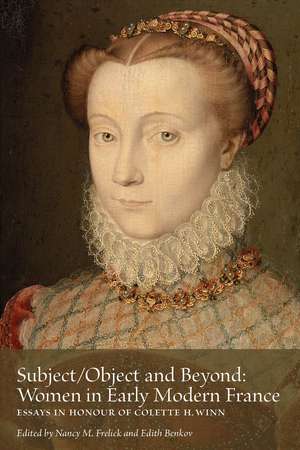Subject/Object and Beyond – Women in Early Modern France: Reflections on Early Modernity / Reflexions sur la premiere modernite
Autor Nancy M. Frelick, Edith Benkoven Limba Engleză Paperback – 18 mar 2024
Subject/Object and Beyond brings together essays by established and emerging scholars to honor the exceptionally rich contributions and career of scholar Colette H. Winn. It also celebrates fifty years of sustained scholarship on early modern women, along with the foundation of Women’s Studies as a recognized academic discipline in North America. The collection comprises seventeen articles that explore multiple perspectives on early modern women, including their writings, translations, reception, and contributions to various fields, including literature, music, politics, religion, and science.
Preț: 371.04 lei
Preț vechi: 458.07 lei
-19% Nou
Puncte Express: 557
Preț estimativ în valută:
70.100€ • 74.98$ • 59.09£
70.100€ • 74.98$ • 59.09£
Carte disponibilă
Livrare economică 23 decembrie 24 - 06 ianuarie 25
Livrare express 07-13 decembrie pentru 40.07 lei
Preluare comenzi: 021 569.72.76
Specificații
ISBN-13: 9781649591036
ISBN-10: 1649591039
Pagini: 428
Ilustrații: 1 color plate, 3 halftones
Dimensiuni: 152 x 228 x 25 mm
Greutate: 0.73 kg
Editura: University of Chicago Press
Seria Reflections on Early Modernity / Reflexions sur la premiere modernite
ISBN-10: 1649591039
Pagini: 428
Ilustrații: 1 color plate, 3 halftones
Dimensiuni: 152 x 228 x 25 mm
Greutate: 0.73 kg
Editura: University of Chicago Press
Seria Reflections on Early Modernity / Reflexions sur la premiere modernite
Notă biografică
Nancy M. Frelick is associate professor of French and Renaissance Studies at the University of British Columbia. Edith J. Benkov is professor emerita of French and European Studies at San Diego State University.
Cuprins
Illustrations vii
Contributors ix
Préface
François Rouget xvii
Colette H. Winn Publications 1
Introduction
Nancy M. Frelick, Edith Benkov 15
PART ONE
Translating “damoiselline facherie”: Claude Scève, Claude Nourry,
and Urbain le mescongneu filz de l’Empereur Federic Barberousse
Emily E. Thompson 25
Hélisenne de Crenne’s “Roman de Dido”
Marian Rothstein 49
« Car ce te sera honte de quereler avec une femme » :
Hélisenne de Crenne, Louise Labé et la satire au féminin
Bernd Renner 71
Lost in the Labérynthe: Mythologizing Louise Labé and the École lyonnaise
Nancy M. Frelick 91
PART TWO
From Trickery to Triumph: Female Alliances and the Paths to Power
in Heptaméron 4 and 58
Dora E. Polachek 127
Femmes, bagues et anneaux dans l’Heptaméron : le labyrinthe
rhétorique du parcours amoureux
Brigitte Roussel 149
Cross-Dressed Monks in Saints’ Lives and Their Parodies:
A Source for Heptaméron 31
Scott Francis 173
Chasteté et honneur des veuves de l’Heptaméron de Marguerite
de Navarre
Cynthia Skenazi 195
Gossip, Commérage, and Caquets: Women’s Words in Early Modern France
Kathleen M. Llewellyn 213
PART THREE
A Huguenot Noblewoman’s Poetry Collection:
The Album Belonging to Louise de Coligny (1555–1620)
Jane Couchman 237
The Poetics of a Poetry Album
Stephen Murphy 263
Music for Women and Fleas: The Example of Catherine Des Roches
Kendall Tarte 287
Souvenir anatomique d’une femme : l’autopsie en vers de Madame
de Mercoeur
Hélène Martin 309
PART FOUR
La tragicomédie du suicide couplé, ou : lien et devoir conjugal selon « De trois bonnes femmes » (Montaigne, Essais, II, 35)
Corinne Noirot 337
“Le mestier des femmes”: Queens, Nuns, Peacemaking, and the
Wars of Religion
Edith Benkov 361
Reading the Bodies of Witches: The Case of Jeanne des Anges
(1632–1637)
Cathy Yandell 381
“[Dieu] se servit de Jeanne d’Arc”: The Textual Public Identity and Political Agency of Mining Engineer Martine de Bertereau, Baronne de Beausoleil (c. 1584–c. 1643)
Anne R. Larsen 403
Contributors ix
Préface
François Rouget xvii
Colette H. Winn Publications 1
Introduction
Nancy M. Frelick, Edith Benkov 15
PART ONE
Translating “damoiselline facherie”: Claude Scève, Claude Nourry,
and Urbain le mescongneu filz de l’Empereur Federic Barberousse
Emily E. Thompson 25
Hélisenne de Crenne’s “Roman de Dido”
Marian Rothstein 49
« Car ce te sera honte de quereler avec une femme » :
Hélisenne de Crenne, Louise Labé et la satire au féminin
Bernd Renner 71
Lost in the Labérynthe: Mythologizing Louise Labé and the École lyonnaise
Nancy M. Frelick 91
PART TWO
From Trickery to Triumph: Female Alliances and the Paths to Power
in Heptaméron 4 and 58
Dora E. Polachek 127
Femmes, bagues et anneaux dans l’Heptaméron : le labyrinthe
rhétorique du parcours amoureux
Brigitte Roussel 149
Cross-Dressed Monks in Saints’ Lives and Their Parodies:
A Source for Heptaméron 31
Scott Francis 173
Chasteté et honneur des veuves de l’Heptaméron de Marguerite
de Navarre
Cynthia Skenazi 195
Gossip, Commérage, and Caquets: Women’s Words in Early Modern France
Kathleen M. Llewellyn 213
PART THREE
A Huguenot Noblewoman’s Poetry Collection:
The Album Belonging to Louise de Coligny (1555–1620)
Jane Couchman 237
The Poetics of a Poetry Album
Stephen Murphy 263
Music for Women and Fleas: The Example of Catherine Des Roches
Kendall Tarte 287
Souvenir anatomique d’une femme : l’autopsie en vers de Madame
de Mercoeur
Hélène Martin 309
PART FOUR
La tragicomédie du suicide couplé, ou : lien et devoir conjugal selon « De trois bonnes femmes » (Montaigne, Essais, II, 35)
Corinne Noirot 337
“Le mestier des femmes”: Queens, Nuns, Peacemaking, and the
Wars of Religion
Edith Benkov 361
Reading the Bodies of Witches: The Case of Jeanne des Anges
(1632–1637)
Cathy Yandell 381
“[Dieu] se servit de Jeanne d’Arc”: The Textual Public Identity and Political Agency of Mining Engineer Martine de Bertereau, Baronne de Beausoleil (c. 1584–c. 1643)
Anne R. Larsen 403
Recenzii
“These essays give a sense of the really broad and incredibly varied swath of studies in early modern literature and culture that Colette Winn has influenced and helped to cultivate. The field of studying early modern women/writers is an incredibly vibrant, rich, and complex one, with really exciting things happening on many fronts."
“…une contribution substantielle aux études sur les femmes de la première modernité.”
